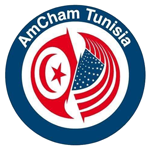1 The Roundtable entitled “Investing for positive impact on Women in Africa”, organized by the American Chamber of Commerce of Tunisia with The ‘Chambre Nationale des Femmes Chefs d’Entreprises’ (CNFCE), was held on February 5th, 2020, in Tunis.
2 The session coincided with the Prosper Africa Opening Conference taking place on the 6th that gathered actors from the U.S. & African public and private sector to facilitate bi-lateral trade between the U.S. and the countries of Africa.
3 The objective of the round table was to bring together American & African Public and Private sector female leaders to discuss good practices and experiences in promoting gender parity through gender lens investing
4 Considering the global gender gap in access to the labor market, the MENA region is still quite behind for women at 17% female compared to males at 65% in 2018, regional specific awareness can shine a light on how to target issues accordingly.
5 The 2015 McKinsey Global Institute Report reveals that if the gender gap were closed, the MENA region would have $2.7 trillion of additional GDP in 2025 with Sub Saharan Africa looking to gain $0.3 to $0.7 trillion.
6 The types of organizations that investors should consider to positively impact gender parity:
- Companies that support workplace gender equality
- Businesses led by women
- Companies that promote equality through their products or services
7 Equal opportunity rightly finds its role as Sustainable Development Goal number 5 of 17 put forth by the United Nations in a 2030 Agenda for Sustainable development
SDG 5 – To achieve gender equality and empower all women and girls
8 IRIS Gender Investment Lens Metrics:
By the Global Impact Investing Network
1 Anti Discrimination Policies
2 Gender Wage Equity
3 Board Diversity
4 Number of Female Employees Promoted
5 Number of Female Founders
6 Number of Female Full-time Employees
7 Number of Full-time Female Managers
8 Gender Ratio of Promotions
9 Products Targeted to Women
9 Summary of Recommendations made during Round table discussions:
- Conducive legal environment
Continually working towards legislative changes across the continent that support gender equality is one of the first steps that should be taken in the journey to achieving equality.
- Skills and Competencies Development
Survival and growth depend on access and education to utilize a full range of entrepreneurial training necessary to thrive in their environment.
- Access to financing
Knowledge of where to find investment, access to funders by their distance, societal approachability, linguistic communication barriers, and assistance through the process.
- Supporting women working in male dominated sectors
Women currently working in or entering into a traditionally male dominated sector flourish when awareness and social support systems are in place.
- Long term supportive lending
Utilizing a different, long term, mentorship like approach to investing encourages women to keep them on a path to grow into their fullest potential.
- Foster Female Communities of Entrepreneurs
Communities build, fail, and rebuild together. When social norms have not yet changed in many areas in regard to women in business, finding like minded support is crucial.
- Micro-financing models
The model sees continued success on the continent because of its holistic consideration of the borrowers. They often allow for the first stages of a business to become a reality.
- Change the language
Instead of being seen as a women’s issue, gender parity should be viewed as a business issue because of the proven gains to attained with adapting equality.


















